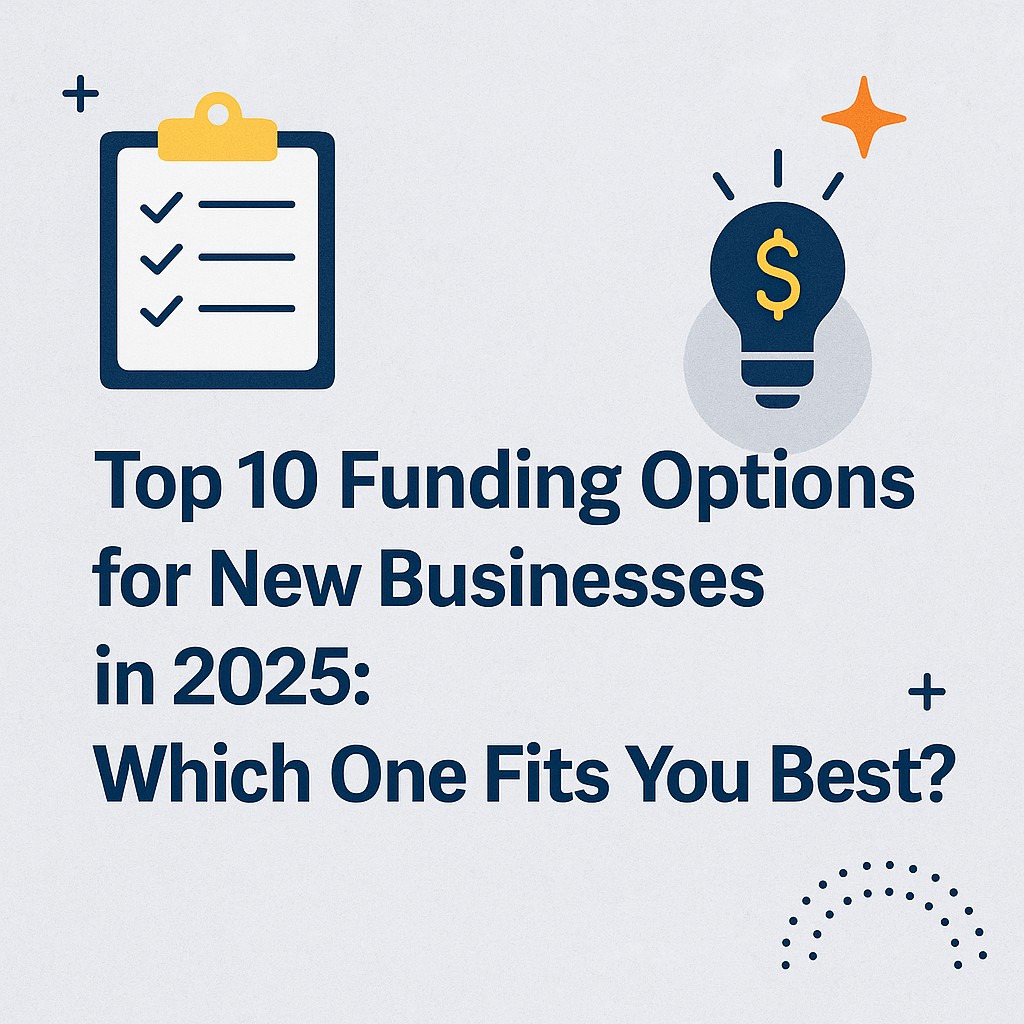Why Choosing the Right Funding Option Matters
Starting a new business is exciting, but every entrepreneur faces the same critical question: how do I fund my startup? In 2025, entrepreneurs have more choices than ever before—ranging from traditional loans to innovative alternatives like crowdfunding and revenue-based financing.
The challenge is not finding funding; it’s choosing the best funding option that fits your unique business model, industry, and goals. That’s where expert guidance becomes essential. At YMA Financial, we help entrepreneurs evaluate funding strategies, build strong business plans, and secure financing that accelerates growth.
This guide explores the top 10 funding options for new businesses in 2025 and helps you identify which one works best for your startup.
1. SBA Loans – Reliable Government-Backed Funding
Small Business Administration (SBA) loans remain one of the most trusted ways to fund a startup. These loans offer lower interest rates, longer repayment terms, and government-backed guarantees.
Pros:
-
Competitive interest rates
-
Flexible repayment options
-
Trusted by lenders
Cons:
-
Lengthy application process
-
Requires strong documentation
👉 Business Plan Consultation page – BUSINESS PLAN CONSULTATION – YMA FINANCIAL – PROVIDING REAL-WORLD GUIDANCE AND SOLUTIONS TO SUCCESS
2. Traditional Bank Loans – Best for Established Entrepreneurs
Banks continue to be a go-to funding source for entrepreneurs with solid credit and established businesses.
Pros:
-
Large loan amounts available
-
Structured repayment schedules
Cons:
-
Requires excellent credit history
-
May need collateral
3. Business Credit Cards – Flexible Startup Funding
When you need fast access to working capital, business credit cards can be a smart option.
Pros:
-
Immediate credit availability
-
Rewards and cashback programs
Cons:
-
Higher interest rates
-
Easy to accumulate debt
👉 Business Credit Building services – BUILDING BUSINESS CREDIT – YMA FINANCIAL – PROVIDING REAL-WORLD GUIDANCE AND SOLUTIONS TO SUCCESS
4. Angel Investors – Funding with Mentorship
Angel investors provide capital in exchange for equity. Beyond funding, they often bring valuable mentorship and connections.
Pros:
-
Access to expertise and networks
-
Flexible deal structures
Cons:
-
Equity dilution
-
Investors may influence business direction
5. Venture Capital – High Growth Potential Funding
If your business is scalable and growth-driven, venture capital (VC) may be the best fit.
Pros:
-
Significant capital for expansion
-
Access to investor expertise
Cons:
-
Equity loss
-
Requires strong growth trajectory
6. Crowdfunding – Community-Backed Financing
Platforms like Kickstarter and Indiegogo allow startups to raise funds directly from consumers.
Pros:
-
Market validation before launch
-
No repayment required (reward-based)
Cons:
-
Time-intensive marketing campaigns
-
Success is not guaranteed
7. Grants for Small Businesses – Free Capital
Government agencies and private organizations offer grants for small businesses, especially in technology, green energy, and social impact industries.
Pros:
-
No repayment required
-
Support innovation
Cons:
-
Highly competitive
-
Strict eligibility requirements
8. Revenue-Based Financing – Pay as You Grow
A modern funding solution, revenue-based financing allows you to repay a percentage of monthly revenue until the debt is cleared.
Pros:
-
Payments adjust with business performance
-
No equity loss
Cons:
-
Higher overall repayment cost
-
Limited to revenue-driven businesses
9. Microloans – Ideal for Small Startups
Microloans from non-profits and community lenders are great for businesses needing smaller amounts.
Pros:
-
Easier to qualify for
-
Supports underserved entrepreneurs
Cons:
-
Lower funding amounts
-
Higher interest rates compared to bank loans
10. Friends and Family Funding – Personal Network Support
Many startups turn to their personal networks for seed funding.
Pros:
-
Quick access to capital
-
Flexible terms
Cons:
-
Can strain relationships
-
Limited funding amounts
Which Business Funding Option Fits You Best in 2025?
The right funding option depends on:
-
Your business stage (idea, launch, growth)
-
Your credit score and financial health
-
Whether you prefer debt or equity financing
At YMA Financial, we help entrepreneurs weigh these factors, prepare business plans, and connect with the best funding sources available.
👉 Business Coaching Services page – Services – YMA FINANCIAL – PROVIDING REAL-WORLD GUIDANCE AND SOLUTIONS TO SUCCESS
YMA Financial Offers Some Of the Best Strategies
-
Business Consulting & Startup Planning – Contact Us – YMA FINANCIAL – PROVIDING REAL-WORLD GUIDANCE AND SOLUTIONS TO SUCCESS
-
Business Coaching Services– Contact Us – YMA FINANCIAL – PROVIDING REAL-WORLD GUIDANCE AND SOLUTIONS TO SUCCESS
-
Related blog posts:
-
“How to Build Business Credit Quickly in 2025” – Stay ahead in business and financial planning with YMA Financial
-
“50 Best Affiliate Programs for Marketers and Creators in 2025” – Stay ahead in business and financial planning with YMA Financial
-
Final Thoughts: Funding Your Startup the Right Way
Exploring the top 10 funding options for new businesses in 2025 shows that there’s no one-size-fits-all solution. Whether you choose SBA loans, crowdfunding, or venture capital, the key is selecting a strategy that matches your business model and growth goals.
That’s where YMA Financial becomes your partner in success—offering business consulting, funding strategies, and credit-building solutions to ensure your startup thrives.
🚀 Schedule Your Business Consultation with YMA Financial
📞 Phone: 864-249-1439
🌐 Website: www.ymafinancial.com
📩 Book Your Consultation: Schedule Your Business Consultation
Take control of your future and secure the funding your business deserves.


